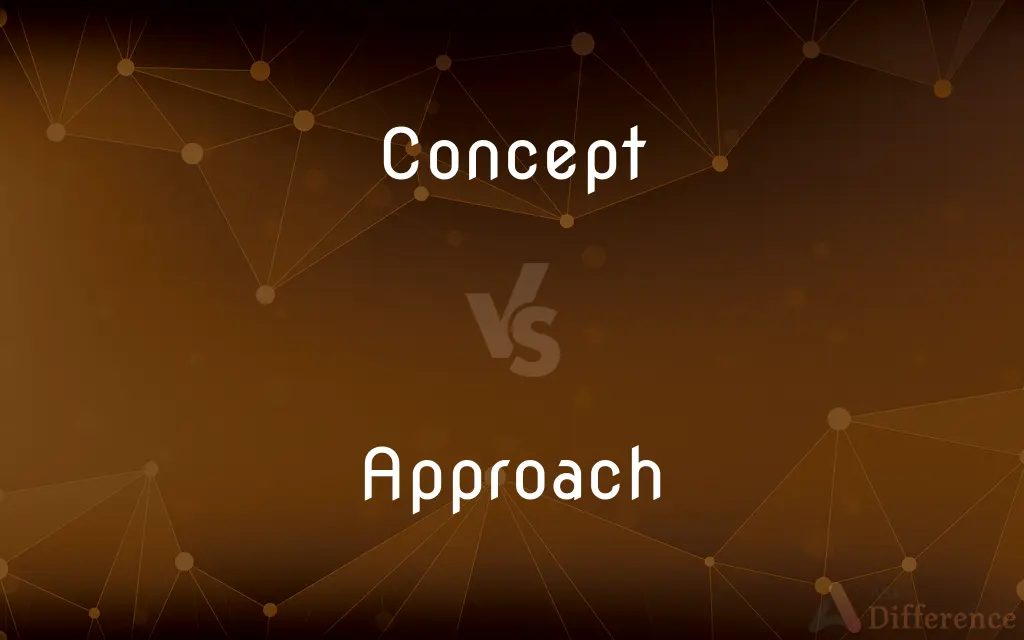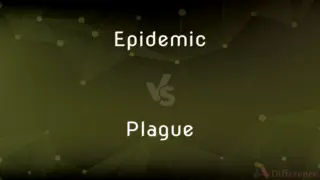Concept vs. Approach — What's the Difference?
By Fiza Rafique & Urooj Arif — Updated on April 17, 2024
A concept is a general idea or understanding, often theoretical, while an approach is a method or strategy for dealing with a specific problem or task.

Difference Between Concept and Approach
Table of Contents
ADVERTISEMENT
Key Differences
A concept is an abstract idea or a mental symbol that is typically generalized from particular instances. Whereas, an approach refers to a way or method of dealing with a specific issue or problem, focusing more on practical application.
Concepts are foundational in developing knowledge and are used to help categorize and interpret information. On the other hand, approaches are actionable strategies or plans tailored to achieve certain objectives.
In academic settings, concepts are often discussed as parts of theories and models, serving as the building blocks for systematic study. Whereas approaches are implemented in case studies, experiments, or real-world applications, demonstrating how theories and concepts can be operationalized.
Concepts can exist independently of practical applications, and are often universal across various fields of study. On the other hand, approaches are usually specific to particular disciplines or scenarios, reflecting the diversity in application.
Understanding a concept often involves cognitive and analytical skills to grasp its theoretical aspects. Whereas mastering an approach requires practical skills and the ability to apply theoretical knowledge in specific contexts.
ADVERTISEMENT
Comparison Chart
Definition
A general idea or mental symbol, often abstract.
A specific way or method to address a problem.
Application
Used universally across fields as a way to understand and categorize information.
Specific to scenarios or disciplines, tailored to practical outcomes.
Dependency
Independent of practical application.
Dependent on the problem or task at hand.
Skills Required
Cognitive and analytical to understand.
Practical and tactical for implementation.
Relationship to Practice
Often theoretical, serves as a foundation for further study.
Directly linked to practical implementation and results.
Compare with Definitions
Concept
A foundational idea that underpins a theory.
The concept of evolution is fundamental to modern biology.
Approach
A particular method or way of doing something.
His approach to solving conflicts involves open communication.
Concept
An intellectual construct used in academic discourse.
The concept of cultural capital can be crucial in understanding social inequality.
Approach
A strategy devised for tackling a specific problem.
The scientific approach relies heavily on experimentation.
Concept
A mental representation of an idea or theory.
The concept of gravity explains why objects fall toward the earth.
Approach
The way in which a problem is confronted or a task is commenced.
Different cultures might have varying approaches to education.
Concept
An abstract principle that guides further study and application.
The concept of justice is central to many legal systems.
Approach
A technique or process used in a particular area of study or activity.
The therapeutic approach to psychology focuses on mental health recovery.
Concept
A category used to classify and organize complex information.
The concept of species helps biologists sort organisms.
Approach
A manner of dealing with something in a systematic way.
Her approach to the project was very organized and methodical.
Concept
Concepts are defined as abstract ideas or general notions that occur in the mind, in speech, or in thought. They are understood to be the fundamental building blocks of thoughts and beliefs.
Approach
To come near or nearer, as in space or time
Spring approaches.
Concept
An abstract idea
Structuralism is a difficult concept
The concept of justice
Approach
(Sports) To make an approach, as in golf.
Concept
A general idea or understanding of something
The concept of inertia.
The concept of free will.
Approach
To come or go near or nearer to
Approached the tunnel.
Concept
A plan or original idea
The original concept was for a building with 12 floors.
Approach
To come close to, as in appearance, quality, or condition; approximate
The performance approaches perfection.
Concept
A unifying idea or theme, especially for a product or service
A new restaurant concept.
Approach
To make a proposal or overtures to with a specific end in view
Approached the administration for a raise.
Concept
Having an experimental or strikingly different design, especially to test or demonstrate new features
A concept car.
Approach
To begin to deal with or work on
Approached the task with dread.
Approached the issue from a historical perspective.
Concept
An abstract and general idea; an abstraction.
Approach
The act of approaching
The approach of night.
Concept
Understanding retained in the mind, from experience, reasoning and imagination; a generalization (generic, basic form), or abstraction (mental impression), of a particular set of instances or occurrences (specific, though different, recorded manifestations of the concept).
Approach
A fairly close resemblance; an approximation.
Concept
(generic programming) A description of supported operations on a type, including their syntax and semantics.
Approach
A way or means of reaching something; an access
An approach to the bridge.
Concept
To conceive; to dream up
Approach
The method used in dealing with or accomplishing
A logical approach to the problem.
Concept
An abstract general conception; a notion; a universal.
The words conception, concept, notion, should be limited to the thought of what can not be represented in the imagination; as, the thought suggested by a general term.
Approach
An advance or overture made by one person to another.
Concept
An abstract or general idea inferred or derived from specific instances
Approach
The golf stroke following the drive from the tee with which a player tries to get the ball onto the putting green.
Approach
The steps taken prior to executing a competitive maneuver, as by a diver before diving forward from a springboard or by a bowler before delivering the ball.
Approach
The part of the area behind the foul line in a bowling alley used by a bowler in delivering the ball.
Approach
(intransitive) To come or go near, in place or time; to move toward; to advance nearer; to draw nigh.
Approach
To play an approach shot.
Approach
Used intransitively, followed by to: to draw near (to someone or something); to make advances; to approximate or become almost equal.
He approaches to the character of the ablest statesman.
Approach
Of an immovable object or a number of such objects: to be positioned as to (notionally) appear to be moving towards (a place).
As we drove along the driveway, the trees approaching the house seemed more eerie.
Approach
To move toward (someone or something) in place, time, character, or value; to draw nearer to.
“Would counsel please approach the bench?” asked the judge.
He approached the age of manhood.
Approach
(transitive) To bring (something) near something else; to cause (something) to draw near.
Approach
(transitive) To attempt to make (a policy) or solve (a problem).
Approach
(transitive) To bring up or propose to (someone) an idea, question, request, etc.
Approach
To take approaches to (a place); to move towards (a place) by using covered roads, trenches, or other works.
Approach
An act of drawing near in place or time; an advancing or coming near.
Approach
An act of coming near in character or value; an approximation.
Approach
An avenue, passage, or way by which a building or place can be approached; an access.
Approach
(climbing) A path taken to reach the climbing area, for example, from a car park, road, etc.
Approach
(figuratively) A manner of making (a policy) or solving (a problem, etc.).
Approach
(archaic) An opportunity of drawing near; access.
Approach
The way an aircraft comes in to land at an airport.
Approach
A specific procedure used for approaching and landing at an airport.
We flew the RNAV/GPS A approach to runway 16.
Approach
(bowling) The area before the lane in which a bowler may stand or run up before bowling the ball.
Approach
To come or go near, in place or time; to draw nigh; to advance nearer.
Wherefore approached ye so nigh unto the city?
But exhorting one another; and so much the more, as ye see the day approaching.
Approach
To draw near, in a figurative sense; to make advances; to approximate; as, he approaches to the character of the ablest statesman.
Approach
To bring near; to cause to draw near; to advance.
Approach
To come near to in place, time, or character; to draw nearer to; as, to approach the city; to approach my cabin; he approached the age of manhood.
He was an admirable poet, and thought even to have approached Homer.
Approach
To take approaches to.
Approach
The act of drawing near; a coming or advancing near.
A nearer approach to the human type.
Approach
A access, or opportunity of drawing near.
The approach to kings and principal persons.
Approach
Movements to gain favor; advances.
Approach
A way, passage, or avenue by which a place or buildings can be approached; an access.
Approach
The advanced works, trenches, or covered roads made by besiegers in their advances toward a fortress or military post.
Approach
See Approaching.
Approach
A stroke whose object is to land the ball on the putting green. It is made with an iron club.
Approach
That part of a flight during which an airplane descends toward the landing strip.
Approach
The steps taken by a bowler just before delivering the ball toward the pins.
Approach
Ideas or actions intended to deal with a problem or situation;
His approach to every problem is to draw up a list of pros and cons
An attack on inflation
His plan of attack was misguided
Approach
The act of drawing spatially closer to something;
The hunter's approach scattered the geese
Approach
A way of entering or leaving;
He took a wrong turn on the access to the bridge
Approach
The final path followed by an aircraft as it is landing
Approach
The event of one object coming closer to another
Approach
A tentative suggestion designed to elicit the reactions of others;
She rejected his advances
Approach
The temporal property of becoming nearer in time;
The approach of winter
Approach
A close approximation;
The nearest approach to genius
Approach
A relatively short golf shot intended to put the ball onto the putting green;
He lost the hole when his approach rolled over the green
Approach
Move towards;
We were approaching our destination
They are drawing near
The enemy army came nearer and nearer
Approach
Come near or verge on, resemble, come nearer in quality, or character;
This borders on discrimination!
His playing approaches that of Horowitz
Approach
Begin to deal with;
Approach a task
Go about a difficult problem
Approach a new project
Approach
Come near in time;
Winter is approaching
Approaching old age
Approach
Make advances to someone, usually with a proposal or suggestion;
I was approached by the President to serve as his adviser in foreign matters
Common Curiosities
Are approaches dependent on concepts?
Often, approaches are developed based on underlying concepts but are more focused on practical application.
How do concepts differ from approaches?
Concepts are abstract ideas or principles, while approaches are practical methods or strategies.
What is a concept?
A concept is a general idea or understanding that is abstract and often theoretical.
Can a single concept have multiple approaches?
Yes, a single concept can have multiple approaches depending on how it is interpreted or applied.
Can a concept be applied like an approach?
Concepts provide the theoretical foundation, but they need specific approaches to be applied practically.
What is an approach?
An approach is a specific method or strategy used to address a problem or task.
Do all fields of study use concepts and approaches?
Yes, all fields of study develop and utilize concepts and approaches, though in different ways.
How does one develop a new approach?
Developing a new approach often involves creative thinking, experimentation, and adaptation of existing methods.
How are concepts used in developing business strategies?
Concepts in business strategies serve as the basis for developing actionable plans and approaches to meet business objectives.
Is an approach always practical?
Yes, approaches are inherently practical as they are methods of dealing with specific tasks or problems.
Why are approaches important in research?
Approaches guide the methodology of research, influencing how data is collected, analyzed, and interpreted.
What is the impact of a good approach in business?
A good approach in business can lead to efficient problem-solving, better management, and successful outcomes.
What differentiates a scientific approach from a non-scientific one?
A scientific approach is characterized by systematic experimentation, observation, and the use of empirical evidence, whereas non-scientific approaches might rely on intuition, tradition, or other non-empirical methods.
What role do concepts play in education?
In education, concepts serve as the fundamental elements that students need to understand before applying knowledge practically.
Can approaches evolve over time?
Yes, approaches can and do evolve as new information and technologies become available.
Share Your Discovery

Previous Comparison
Potoroo vs. Pademelon
Next Comparison
Epidemic vs. PlagueAuthor Spotlight
Written by
Fiza RafiqueFiza Rafique is a skilled content writer at AskDifference.com, where she meticulously refines and enhances written pieces. Drawing from her vast editorial expertise, Fiza ensures clarity, accuracy, and precision in every article. Passionate about language, she continually seeks to elevate the quality of content for readers worldwide.
Co-written by
Urooj ArifUrooj is a skilled content writer at Ask Difference, known for her exceptional ability to simplify complex topics into engaging and informative content. With a passion for research and a flair for clear, concise writing, she consistently delivers articles that resonate with our diverse audience.
















































